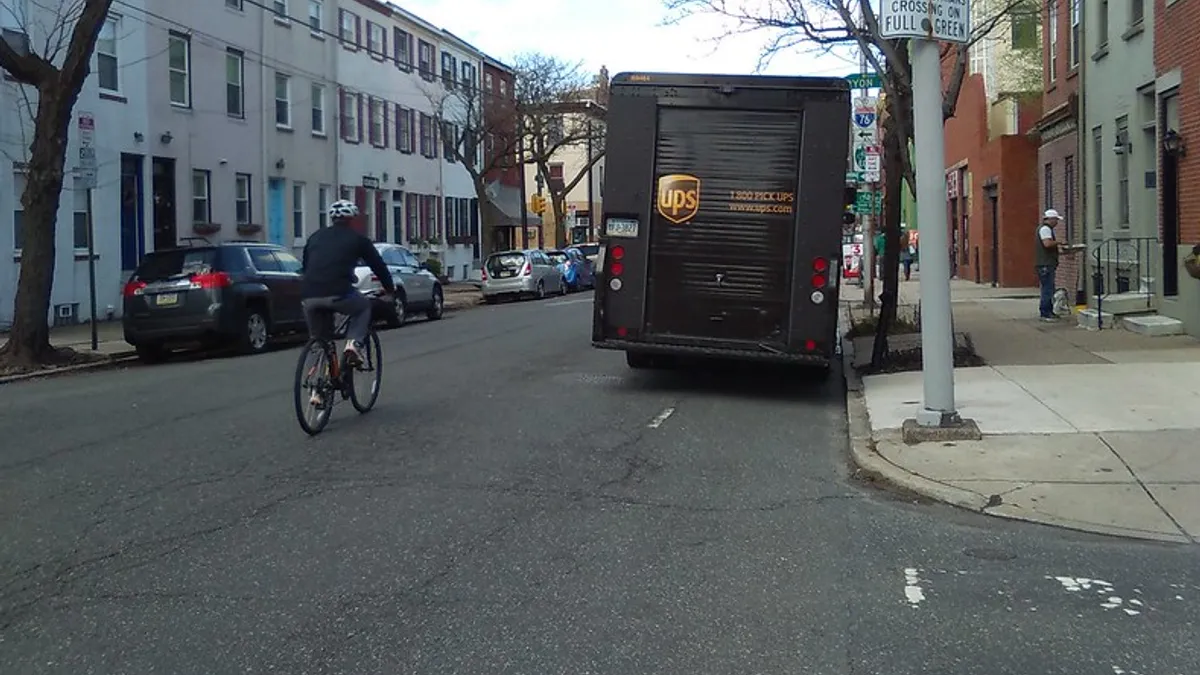Dive Brief:
- UPS is encouraging customers to bring holiday volume forward and even avoid shipping when possible, as the carrier faces a hectic peak season. "We work with our customers to help them rethink their operations via buy online pick up in-store, different timing for their promotions and different availability of their packages," UPS CEO Carol Tomé said on a Wednesday earnings call. UPS domestic volume was up nearly 14% YoY in Q3.
- Tomé has emphasized since she took the helm in June that UPS will use pricing and surcharges to navigate the e-commerce boom brought on by the pandemic. "There is a shift in certain customers who are more price-sensitive than others," she said. "We're okay with that." Domestic cost per piece was up 4.4% YoY in Q3 while revenue per piece increased 2.5% YoY in the same period. Adjusted operating profit in the U.S. domestic package market declined by 8.8%.
- UPS and the other major parcel carriers levied surcharges or raised prices since the beginning of the pandemic — reflecting the lack of capacity in the parcel market. "Really what we're hearing is all of these carriers, they are not accepting any new customers through the end of the year," Convey Founder Dan Bebout said in a webinar Tuesday.
Dive Insight:
"We are projecting a pretty peaky peak, but there are some industry capacity constraints," Tomé said.
The challenges to U.S. profitability could mean that the price increases and surcharges are here to stay beyond the pandemic, along with e-commerce volumes.
"We don't think the penetration of e-commerce retail sales will decline even after the pandemic," Tomé said.
UPS expects its quarterly growth will moderate in the fourth quarter. This is evidence of a maxed-out network and the choice of quality over quantity when it comes to revenue, which has been Tomé's rallying cry since her first earnings call as CEO in July. Tomé, still new on the job, said she is in the process of reviewing UPS's internal operations top to bottom and expects to make further changes in how the business measures success and incentivizes staff still to come. Plus, she sees the current climate as the new normal for the small parcel business and is preparing UPS accordingly.
Benefits paid to workers, lower delivery density and lower productivity brought on the U.S. operating profit decline, the CEO said. Onboarding time for seasonal hires and general churn is to blame for the dip in general productivity, she added. The carrier set out to hire 100,000 additional workers for peak in September, just after shuffling executives around in August.
All of this points to more price hikes for shippers. UBS analyst Thomas Wadewitz expects domestic package pricing to increase 3% to 4% in 2021, he wrote in a research note published before UPS reported.
Though prices are headed up above historical rates of increase, Tomé said domestic service is improving after investments UPS made this year to speed up ground service.
"We have improved ground transit times between millions of zip codes," she said. "And we will be at parity, or better than the competition in 20 of the 25 most populated U.S. markets."
Tomé's plans to up efficiency at UPS may benefit shippers in that on-time delivery supports their businesses. Investments that will help the carrier manage the coming onslaught include the upgrades to automated sorting, weekend service and greater use of real-time data, the CEO said.
While aiming to improve profitability through more efficient operations in the domestic parcel business, the carrier is looking to bolster margins by expanding into areas of even more outsized growth — namely international freight forwarding and healthcare logistics.
The carrier is adding freezer farm capacity in Louisville, Kentucky, and the Netherlands with equipment that can keep temperatures as low as negative 80 degrees Celsius. Super cold temperatures are essential to COVID-19 vaccine distribution.
We will lean into growth from the right opportunity, like [small and medium businesses], international global freight forwarding and other high yielding sectors," Tomé said.













